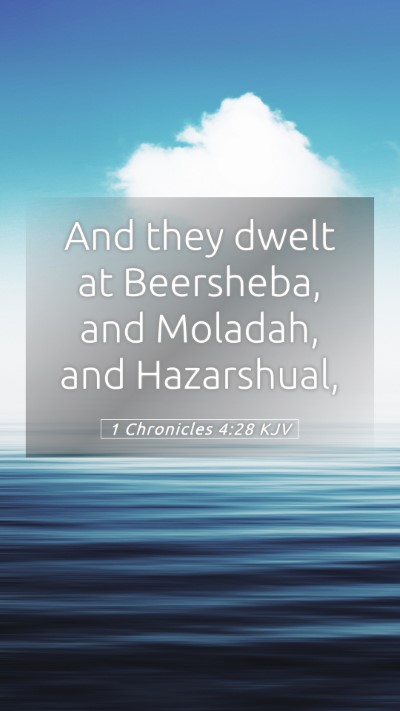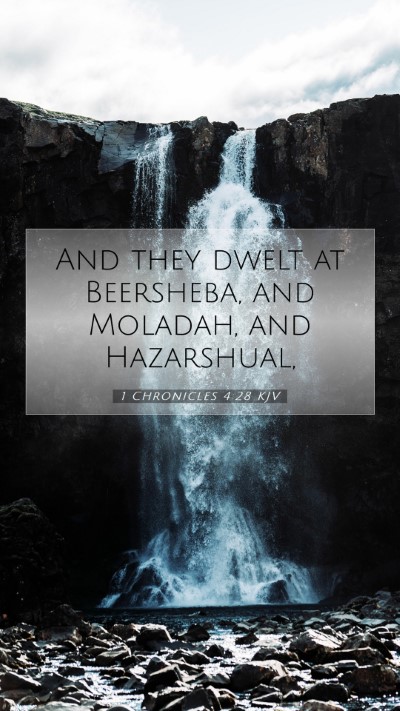Bible Verse Commentary: 1 Chronicles 4:28
Verse: 1 Chronicles 4:28 - "The sons of Benjamin were Bela, and Becher, and Jediah."
Overview and Significance
1 Chronicles 4:28 presents a succinct list of the descendants of Benjamin, highlighting the genealogical importance within the context of the Israelite tribes. The verse serves as a bridge in the broader genealogical narrative found in 1 Chronicles, where detailed family trees underline the historical and spiritual legacy of Israel.
Bible Verse Meanings and Interpretations
In understanding this verse, several commentaries shed light on its significance:
-
Matthew Henry:
Henry emphasizes that genealogies are vital in Scripture, reflecting God's faithfulness in preserving His people through generations. The mention of the sons of Benjamin showcases the continuity of the tribe's identity and God's covenant promises.
-
Albert Barnes:
Barnes notes that the brevity of the verse illustrates the importance of each family within Israel. The descendants are indicated as a means of establishing lineage and tribal association, which was critical for inheritance and land ownership in ancient Israel.
-
Adam Clarke:
Clarke highlights the tribal respect and significance associated with the descendants of Benjamin, noting their pivotal role among the Israelites. He also outlines specific traits or notable characters from these families that would emerge in biblical history.
Understanding Scripture Through Genealogy
Genealogies such as this one serve multiple purposes in Scripture:
-
Historical Context: Provides insight into the historical framework of Israel, showcasing how tribes were organized and identified.
-
Theological Reminder: Reminds us of God's promises to Israel and His ability to preserve a remnant for Himself.
-
Covenantal Significance: Highlights the covenant relationship God has with each tribe, demonstrating His faithfulness through generations.
Cross References
Several other verses provide additional context to 1 Chronicles 4:28:
- Genesis 49:27 - "Benjamin is a ravenous wolf; in the morning he shall devour the prey..."
- Deuteronomy 33:12 - "...the beloved of the Lord shall dwell in safety by him; the Lord shall cover him all the day long..."
- Romans 11:1 - "I say then, has God cast away His people? Certainly not! For I also am an Israelite, of the seed of Abraham, of the tribe of Benjamin."
Applying Bible Verses to Daily Life
The genealogical records, while often overlooked, remind us of the importance of our heritage and identity. Just as the tribe of Benjamin played a significant role in biblical history, we too are part of a larger story in our faith communities today. Understanding our spiritual lineage through Scripture helps infuse meaning into our daily lives.
Bible Study Insights
For those engaged in Bible study groups or personal online Bible study, these genealogical elements encourage deeper inquiry into the roles various tribes played in God's overall narrative of redemption. Embracing this aspect can enhance our Bible study lessons and enrich our understanding of scripture.
Conclusion
1 Chronicles 4:28 encapsulates more than a mere listing of names; it serves as a reflection of the ongoing relationship God has with His people throughout history. As we delve into these verses, let us seek to uncover the deeper narratives of our own spiritual ancestry and the implications of our faith in historical context.
Final Thought
In conclusion, the genealogical record in 1 Chronicles 4:28 invites us to consider our own connections within our faith—and to understand how God’s plan unfolds across the ages, including our place within that divine tapestry.


